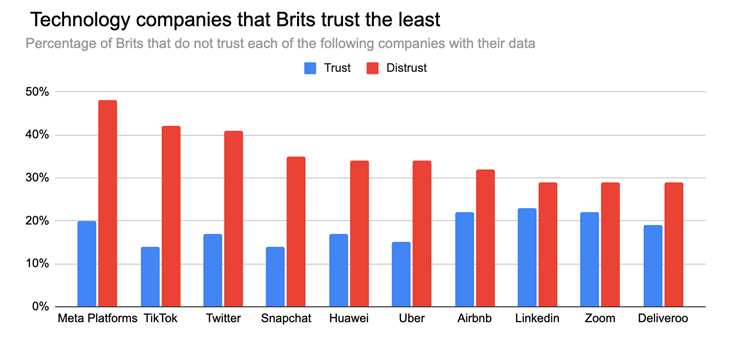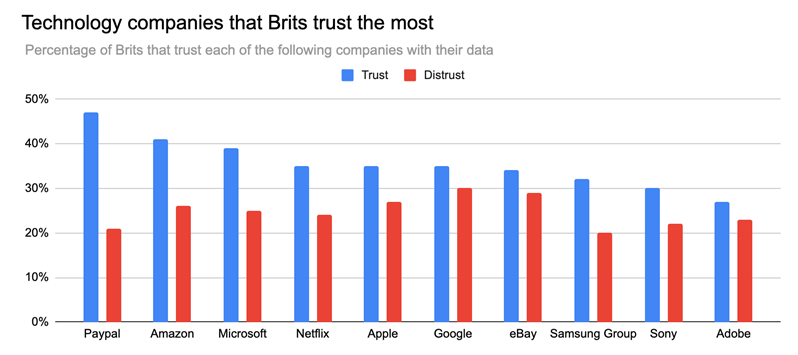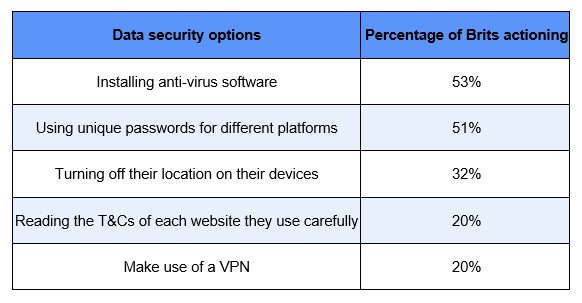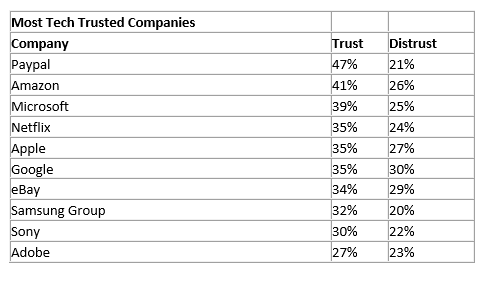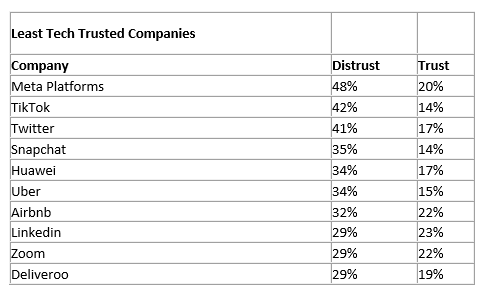Facebook and Instagram owner Meta is the least trusted technology company
The business experts at Forbes Advisor have named Meta as the technology company Brits trust the least with their data. The financial and business services comparison site carried out a nationally representative survey of 2,000 adults to uncover their attitudes towards data protection and divulge how consumers are protecting their privacy online.
- Forbes Advisor names Meta the technology company Brits trust the least with their data, with nearly half (48%) holding the view it is untrustworthy
- Paypal is the most trusted technology company, with almost half (47%) claiming they trust the payments platform with their data
- Nine in ten Brits (90%) are concerned about their data being hacked
- Nearly two thirds are unhappy offering personal data to the government (63%) and more than two in five Brits (43%) are not comfortable sharing their data with the NHS
- Start-ups are the businesses Brits are least happy to share data with, with just 4% of people claiming they are comfortable doing so
- Bank details tops the list for personal information that Brits are most worried about being hacked, with over three quarters (77%) citing this as their greatest concern
- The most common protection people have in place is anti-virus software (53%)
The business experts at Forbes Advisor have named Meta as the technology company Brits trust the least with their data. The financial and business services comparison site carried out a nationally representative survey of 2,000 adults to uncover their attitudes towards data protection and divulge how consumers are protecting their privacy online.
Overall, nearly half (48%) of people claim that they don’t trust Meta owned platforms (Facebook, Instagram and Whatsapp). The social media company has been at the forefront of numerous malicious data breaches, most famously Cambridge Analytica, which allowed the British political consulting firm to harvest the data of up to 87 million people worldwide, without their consent.
Following Meta, the companies Brits trust the least are its social media platform competitors. Overall, more than two in five do not trust TikTok (42%) and Twitter (41%) with their data.
Further analysis uncovered that PayPal is the technology platform trusted by the most Brits, with almost half (47%) trusting the payments platform, which places high value on secure online check outs. This is followed by online marketplace Amazon (41%) and Microsoft (39%).
Notably, of the companies that Brits trust the most, nine out of ten were created pre-2000s. Whereas the majority of companies that Brits trust the least have been operating for less than 20 years. Chinese electronic company Huawei is the only exception to this. Mobile phone companies have been banned from using Huawei technology in their 5G roll out plans following guidance from the National Cyber Security Centre (NCSC).
Which types of organisations are Brits most comfortable sharing their personal data with?
Overall findings revealed that nine in ten Brits (90%) are worried about their data being hacked. Forbes Advisor further questioned this to expose which types of organisations people feel most comfortable sharing personal data with.
Nearly two thirds are unhappy offering it to the government (63%) and more than two in five Brits (43%) are not comfortable sharing personal details with the NHS.
Start-ups are the businesses that Brits are most cautious about sharing data with, as just 4% of people claim they are comfortable doing so. This is followed closely by online gambling (7%) and social media companies (8%).
Younger people are more comfortable when it comes to sharing data with social media platforms. More than one in six 18–34-year-olds are happy to divulge their personal data to the likes of Instagram and TikTok (17%). However, this decreases with age. Just 7% of 35–54-year-olds claim to feel secure offering social media platforms personal data, while just 3% of those aged 55+ do feel secure.
This stands in contrast with public sector organisations such as the NHS. More than half of those aged between 35-54 and 55+ are comfortable sharing data in this instance (64% and 55% respectively), compared to less than half of Gen Z and Millennials (49%).
Bank details is the number one concern for Brits when it comes to being hacked, with over three quarters (77%) citing this as their greatest worry. This is followed by personal details (62%) such as address, date of birth and relationship status.
Data around current location (25%) and income level (20%) were some ways down the list of concerns, while just 4% claim to be concerned about sharing their political views.
How are Brits protecting their privacy online?
Our research uncovered that, overall, nine in ten Brits (90%) are worried about their data being hacked. Further to this, almost two in three (63%) believe that the government is not doing enough to protect our privacy and data online. Such concerns may explain that more than four in five (82%) are taking steps to maintain their privacy online.
The most common protection people have in place is anti-virus software (53%).
Here are the top 5 steps consumers can take to protect their data.
When it comes to social media specifically, one quarter of active users (25%) are not taking steps to protect their account. Out of those who have taken steps to do so, more than one third are making use of different passwords for each account (36%) and adjusting privacy settings on their account (36%) in order to protect their data. Additionally, one in five (21%) are changing their passwords regularly to keep their data private.
Laura Howard, at Forbes Advisor, commented: “Like or not, we all exist in an era where it’s nigh-on impossible to live without sharing your personal data – even if you don’t consider yourself to be particularly ‘digital’.
“Making an online doctor’s appointment, paying a bill via your banking app, getting a discount on your shopping with a supermarket loyalty card, or checking the traffic before setting off on a journey – it all adds to the vast and continuous stream of data related to you and your behaviour as a consumer.
“But our knowledge and awareness around how to protect this data has perhaps not kept pace with the technology. Our recent Forbes Advisor survey found that a staggering nine-in-10 people are worried about their data being hacked – and, as history has shown – these concerns are legitimate.
“However, there are some easy steps consumers can take to minimise this risk. These include adjusting privacy settings on social media accounts, using unique passwords across different platforms (and making them difficult to guess), and installing antivirus software on your laptop.
“As more and more of our daily lives are moved online, investing in a VPN (or ‘virtual private network’) is also a good idea. VPNs, which protect your internet connection and privacy online, are widely available, inexpensive, and can be easily downloaded from the provider’s website. However, our survey found that, despite widespread fears around data breaches, only 20% of respondents had taken this step to protect their data.”
Methodology:
This online survey was taken from a sample of 2,000 adults, representative of the UK population. It was commissioned by Forbes Advisor and conducted by market research company Opinium. Data was collected between 10th – 13th January 2023.
Data regarding which companies Brits trust least: How much do you trust each of the following companies with your data? Please rate your level of trust on a scale of 1-5 where 1 is do not trust at all and 5 is trust completely. Those answering 1 & 2 fell under distrust of the company.
Data: 10 Most and Least Trusted Companies

